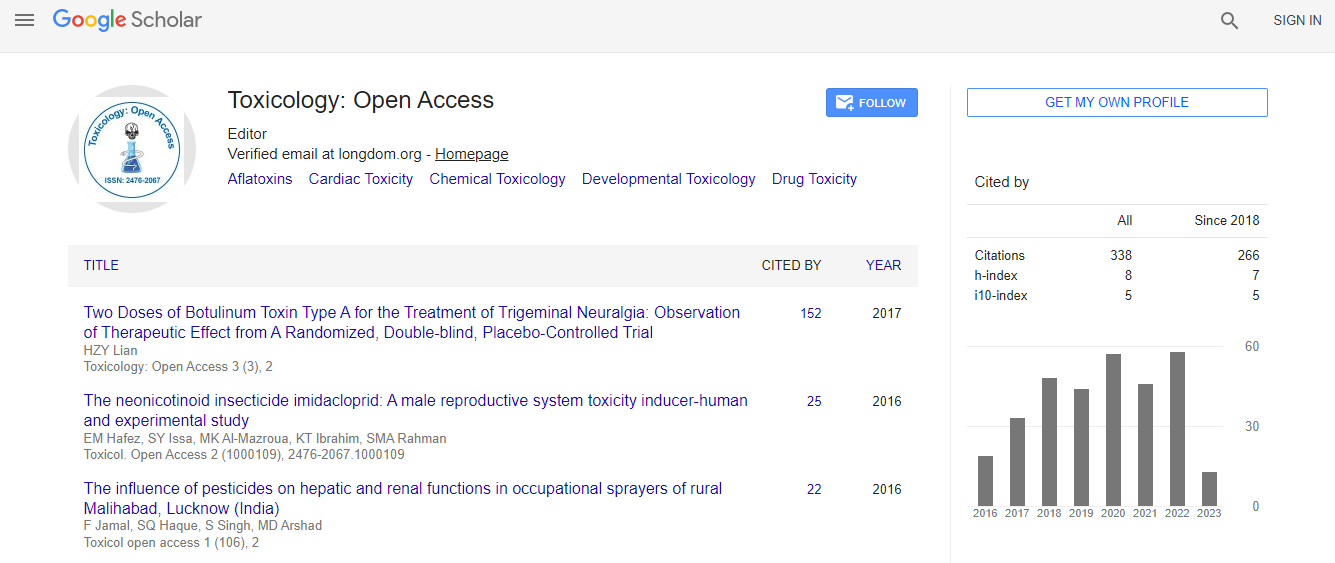Our Group organises 3000+ Global Conferenceseries Events every year across USA, Europe & Asia with support from 1000 more scientific Societies and Publishes 700+ Open Access Journals which contains over 50000 eminent personalities, reputed scientists as editorial board members.
Open Access Journals gaining more Readers and Citations
700 Journals and 15,000,000 Readers Each Journal is getting 25,000+ Readers
Google Scholar citation report
Citations : 336
Toxicology: Open Access received 336 citations as per Google Scholar report
Indexed In
- Google Scholar
- RefSeek
- Hamdard University
- EBSCO A-Z
- Geneva Foundation for Medical Education and Research
- Euro Pub
- ICMJE
Useful Links
Related Subjects
Share This Page
Influence of immune modulation by tumor cell-derived soluble compound
14th World Congress on Toxicology and Pharmacology
Mohammad Amjad Hossain, Adithan Aravinthan, Judith Sharmila, Bumseok Kim, Chang Won Kang, Nam Soo Kim and Jong-Hoon Kim
Chonbuk National University, South Korea
Posters & Accepted Abstracts: Toxicol Open Access
Abstract
Cancer has been viewed as a disease consisting of transformed cells, of hyper proliferative, invasive and immortal nature. Accordingly, the anti-cancer strategies are also focused on tumor cells only. In the present study, the gastric cancer cell (SNU-484) soluble compounds have been evaluated for its immunosuppression properties. The proteins present in the SNU484 soluble compounds (SC) were identified with human cytokine array. The effect of SC on rat splenocytes has been studied with special emphasis on NK cell activity. In results, the addition of various concentration of SC did not show any significant apoptotic or proliferation changes when compared to untreated control splenocytes. Further the incubation of splenocytes with SC reduced the expression of NK cell markers at the transcription level. The same scenario was observed with the in vivo study following 2 days of treatment. Incubation of splenocytes with SC for a longer period reduced the cytotoxic ability, further this observation was strengthened by the reduction of CD161+CD3-(NK) cells in SC treatment. In addition tests were performed to check whether SC can influence tumor formation in allogenic tumor model. The B16F10 melanoma cells-injected animals developed tumor in 3 weeks, whilst the SC injected animals along B16F10 cells aggravates tumor formation, by increasing the PI3K/AKT levels. These findings clearly demonstrate that the presence of SC can modulate immune system response that favors the tumor formation.Biography
Mohammad Amjad Hossain has completed his graduation from University of Development Alternative, Bangladesh and currently studying MS in Veterinary Medicine from Chonbuk National University School of Veterinary Medicine, South Korea. He has published 2 papers in reputed journals.
Email:mamjadh2@gmail.com

 Spanish
Spanish  Chinese
Chinese  Russian
Russian  German
German  French
French  Japanese
Japanese  Portuguese
Portuguese  Hindi
Hindi 